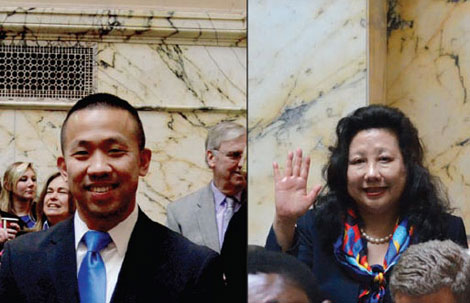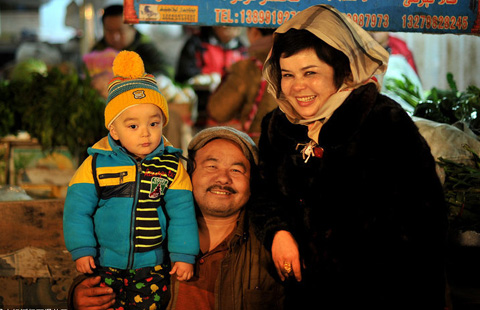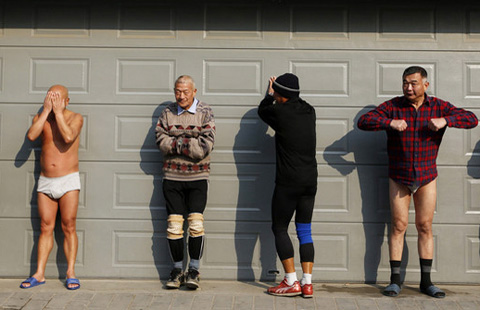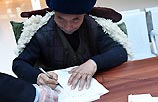China offers more loans to nations in LatAm area
Updated: 2015-01-12 05:25
By Yang Yao in Beijing(China Daily Latin America)
|
||||||||
China vowed to provide more loans to Latin American and Caribbean countries at the ministerial meeting of the Forum of China and the Community of Latin American and Caribbean States (CELAC).
During the meeting, Maduro announced on Jan 7 in his recorded comments from Beijing, broadcast on Venezuela's state television, that China has agreed to invest more than $20 billion in his country to aid it in overcoming an economic slump brought on by plummeting oil prices.
Although the official announcement from the Chinese side emphasized President Xi Jinping's commitment to support Venezuela, there was no specific information about whether Beijing promised additional loans to this South American country.
Xi said on Jan 8 that China supports Venezuela's efforts in restructuring its economy and places great emphasis on manufacturing.
He called for closer cooperation in oil development, infrastructure and technological innovation.
He also said in official announcement that both countries should take better advantage of the China-Venezuela High-Level Mixed Committee and financing systems, allowing funds to target energy, mining, agriculture and industry sectors.
Venezuela, which is estimated to have the world's largest oil reserves and gets 96 percent of its foreign currency from oil exports, confirmed last week that it has entered a recession.
High inflation and shortages of basic goods have spread pessimism about the ability of Caracas to meet debt obligations as oil prices have hit five-and-a-half-year lows, shrinking government revenue.
The reason Maduro traveled to Beijing, observers believe, was to seek a chance to support Venezuela's economy which is hit hard by plummeting crude oil prices.
Some doubts have arisen in regards to the safety of the loans.
Matt Ferchen, resident scholar at the Carnegie-Tsinghua Center for Global Policy, said that it is unclear what the risks are in the short term.
"China's primary interest is the oil and the investment opportunities in Venezuela," he said. "However the question is if China will get more oil given the current poor performance of oil production within Venezuela?"
Ferchen said that if Venezuela does not get the further loans, the country's economy would possibly collapse and of course would not be able to pay back the loans it has had in the past; if it secures additional loans, it means a chance for development, though still with unknown risks.
On Jan 6, foreign ministry spokesperson Hong Lei was asked whether China will consider extending its $4 billion loans to Venezuela due next month.
Hong did not specifically say how China is going to deal with the debt. However, he mentioned that China and Venezuela are important partners for economic cooperation and trade.
"Bilateral cooperation in various fields has registered fast growth with fruitful results over recent years. The two sides enjoy full-fledged and effective cooperation mechanisms in the field of financing. Relevant cooperation between the two countries is running smoothly," he said.
Zhang Jiazhe, scholar with Shanghai Academy of Social Sciences, said that it was a natural choice for Maduro to seek help from China and it is quite logical for China to give loans.
He said that Hugo Chavez, the former president of Venezuela, had taken a series policies allowing Chinese companies to operate big projects in Venezuela including oil exploration.
"The intertwined economic and political relationship has made the two countries strategic partners," he said.
Maduro, who inherited Chavez' policy, is now having difficulty maintaining the preferential policies toward the lower-middle class as the oil export is thwarted by falling crude oil prices. The country, highly dependent on oil as the only economic engine, is in big crisis.
"If he cannot maintain the promises, he will lose supporters," Zhang said.
For China, it is a win-win cooperation or mutual benefit, as the official announcement said.
China's financial support will help countries like Venezuela to overhaul their oil-dependent economies, which have been hit by a steep decline in the price of crude oil. It will also nurture markets for China, Chinese analysts said.
Wu Baiyi, head of the Institution of Latin American Studies at the Chinese Academy of Social Sciences, said Beijing was likely to offer more loans to Caracas during Maduro's visit as their partnership allows China to lend support at a critical time.
"But China would like Caracas to spend the funds in the most needed areas instead of just solving today's emergency, and that means developing a more sustainable, high-quality economy," Wu said.
According to Ferchen, the scholar with Carnegie-Tsinghua, while Venezuela's oil exports to the United States have been falling, those to China have been rising. Beginning at under 50,000 bpd of reported crude exports in the mid-2000s, Venezuelan shipments of crude oil to China grew to an estimated 300,000 bpd in 2013 (ranking Venezuela as China's seventh-largest source of oil imports). These 2013 imports constituted around 5.5 percent of China's overall crude oil imports and about 15 percent of Venezuela's overall crude exports.
Moreover, since 2007, China has become Venezuela's primary source of foreign financing through loans-for-oil deals worth upwards of $50 billion.
"The loans are meant to provide China with preferential, long-term access to Venezuelan crude and petroleum products (in particular fuel oil)," he said. "In turn, Venezuela has been able to tap into China's vast pool of state credit even as it has been cut off from many other sources of international finance. At the same time, China's national oil companies, including the China National Petroleum Corporation (CNPC) and Sinopec, have been key players in Venezuela's expanding Orinoco exploration and production."
He also mentioned in particular that Venezuela produced a special kind of "extra-heavy" oil.
"It means that that it is particularly carbon-rich, so its development carries greater financial and environmental costs than other types of oil," he said.
The two countries are also actively seeking solution for that.
During the Beijing meeting, Maduro also met with China National Petroleum Corporation (CNPC) Director of Board Zhou Jiping on Jan 6 to talk about the expansion of oil field development and increase domestic oil output in Venezuela.
The plan to build a refinery, which is designed to process Venezuela's heavy oil, together with Venezuela's state-run Petroleos de Venezuela SA (PDVSA), has been postponed to 2017.
It was reported by China Petroleum Daily that the plant has the refinery capacity of 400,000 bpd.
yangyao@chinadaily.com.cn

 Two Chinese-American reps sworn in
Two Chinese-American reps sworn in
 Mental illness no handicap to Nanjing artists
Mental illness no handicap to Nanjing artists
 Kashgar's diversity of cultures
Kashgar's diversity of cultures
 Best wedding snaps in 2014
Best wedding snaps in 2014
 Fancy sportscars premiere at Detroit auto show
Fancy sportscars premiere at Detroit auto show
 Looking hot in the cold
Looking hot in the cold
 Beijing sees first winter snow amid heavy smog
Beijing sees first winter snow amid heavy smog
 Elderly swimmers see health benefits in freezing water
Elderly swimmers see health benefits in freezing water
Most Viewed
Editor's Picks

|

|

|

|

|

|
Today's Top News
US official lauds fight by China vs. graft
China plays mediator in Afghanistan
Chinese tourists boost travel to Los Angeles
Pursuing General Tso and his chicken
Videos show attack on USC student
Two Chinese-American reps sworn in
E-commerce firm Wowo to seek $40m in US IPO
Lunar New Year to boost gold sales
US Weekly

|

|







